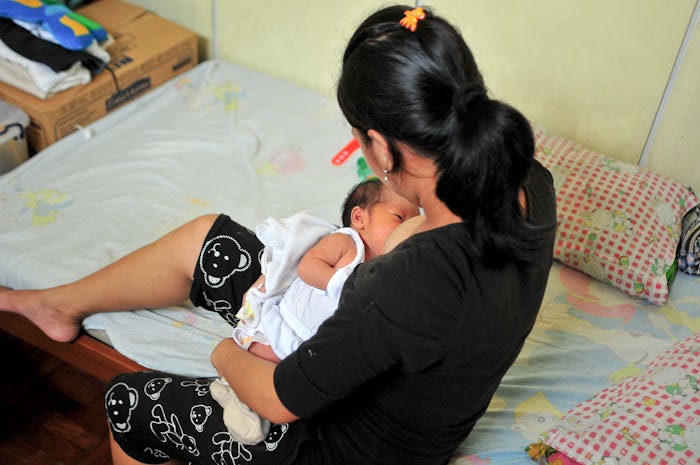Life

The Breastfeeding Mom's Guide To The Norovirus
Very few things can stymie a mother's will to carry on more than dealing with a sick kid. Oh wait — there is one thing. It's when you're sick, too, and breastfeeding, and exhausted, and throwing up, and feverish. All of those things combined result in a generally terrible experience, to say the least. As flu season continues to run roughshod over us all, it's important for new moms to know what to do if they have norovirus while breastfeeding. I wish I could tell you it doesn't happen, I really do. But it can happen. And it's miserably unfair.
Every winter, the norovirus rears its ugly head and makes people vomit. Few get a free pass, and as of right now there is no vaccine for the severe winter stomach flu (although pharmaceutical lab Takeda reportedly has a norovirus vaccine that has made it to the human trial stage). According to the Centers for Disease Control and Prevention:
Norovirus is a very contagious virus that can infect anyone. You can get it from an infected person, contaminated food or water, or by touching contaminated surfaces. The virus causes your stomach or intestines or both to get inflamed. This leads you to have stomach pain, nausea, and diarrhea and to throw up. These symptoms can be serious for some people, especially young children and older adults.
Here's the good news: Norovirus is almost never fatal. The bad news? It's incredibly unpleasant and way too easy to pass around. The virus can live in a host's stool for up to two weeks and is passed through contact with the mouth. People may experience norovirus symptoms like vomiting, headache, diarrhea, fever, fatigue, and chills for 24-48 hours. It tends to be passed quickly through highly populated, closed areas like schools, cruise ships, and day care centers.
So what do you do if you are breastfeeding and happen to be one of the unfortunate victims of norovirus? More importantly, as I know most of you concerned moms out there are wondering, can you pass it along to your baby? "Continue to breastfeed your child, but make sure to increase your hygiene," Dr. Juan Leon, Ph.D., a global health associate professor at Emory University, tells Romper.
When you contract norovirus, your body creates antibodies to protect against the illness. "The mother is transmitting these very protective antibodies to her child in her breast milk," Leon says. Norovirus is less common in babies who are exclusively breastfed, and your milk will help them avoid developing unpleasant symptoms.
If you are breastfeeding while sick, make sure to thoroughly scrub your hands after you go to the bathroom to prevent contaminating your child, Leon adds.
Now on to you. If you've been unfortunate enough to contract norovirus, you should do the following (these won't cure you, but they'll help you manage your symptoms and hopefully stop you from accidentally spreading it to anyone else):
- Stay hydrated. Drink as much water as you can even though you might only be able to manage the odd sip or two.
- Wash your hands with soap and water (don't bother with hand sanitizer, it doesn't do anything for this particular virus).
- Stay at home and rest. You are contagious for at least three days, and want to avoid spreading the disease.
- Ask another adult to help care for your baby so you can rest. Really.
- Avoid handling and preparing food.
- Call your doctor if symptoms last longer than a few days.
Norovirus can be the pits. Hopefully for moms everywhere — especially those that are breastfeeding — it'll all be over soon.
Experts:
Dr. Juan Leon, PhD, global health professor at Emory University
Additional reporting by Eden Lichterman
This article was originally published on